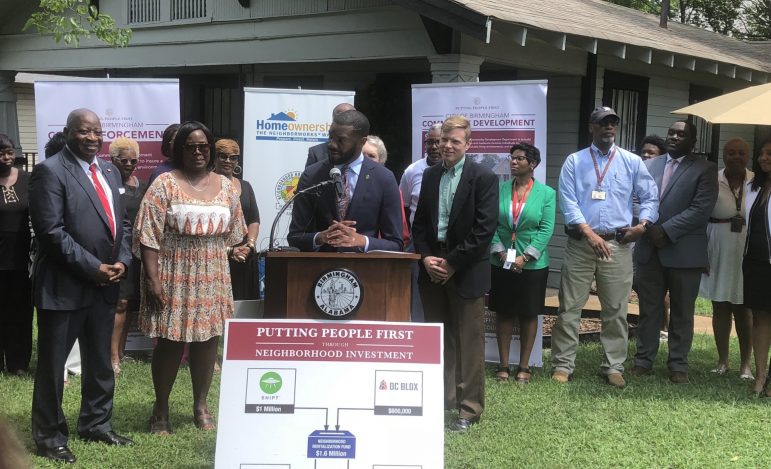Birmingham Mayor Randall Woodfin began his second year in office Thursday. When he was elected, he pledged to improve the quality of life in the city, and make it a safer, more economically vibrant place.
The 37-year-old Woodfin has a list of successes, but he acknowledges there is much more to be done.
Woodfin took the stage with fanfare at his inauguration just behind City Hall. In his first city council meeting as mayor, Valerie Abbott, the council president, said there was a new vibe in the room because of a new mayor and lots of new staff members.
Birmingham’s previous mayor, William Bell, was often at odds with the city council. And as a result, many city initiatives stalled. Woodfin vowed to do things differently, but that’s not exactly how things have played out.
Woodfin has had public disagreements with council members. A number of business in the city have closed, including the store where he bagged groceries as a teen.
And he introduced a plan this summer to repair 100 homes in 100 days, but it’s been slow going.
Woodfin says change takes time.
“I think all of government is a process,” he says. “This is the opposite of the drive-thru culture of fast food restaurants. There is no insta or instant anything. You just can’t (decide) I want this and the next week it happens.”
He has checked some things off of his list. He hired a new police chief this summer and he has hired more police officers. Already this year, police have taken more than 2,000 guns off the street. Still, at least 97 people have died violently in the city this year.
Woodfin says he wants to grow the police force even more.
“When I campaigned, I said I wanted to get our force up to a thousand police officers,” he says. What I’m glad about is that I didn’t say I’d do that in a hundred days because that wouldn’t be realistic.”
Another one of his big campaign promises was to consider the needs of all 99 neighborhoods. He promised to repair streets and sidewalks and get rid of blight. Earlier this year he set up a separate fund for neighborhood revitalization.
That was welcomed news to residents like Willine Body, president of the Graymont Neighborhood Association near Legion Field. And she’s already noticed improvement. The city has cleared some lots and people seemed to be taking better care of their property, she says.
“My worst street is 4th Court West. And I was very encouraged when I walked 4th Court,” Body says.
Besides fixing up the neighborhoods, Woodfin wants to boost the city’s economic development. He established a department focused on job creation and improving the talent pool for business recruitment.
Development continues to grow in some parts of the city, but not all of them.
On the southside and downtown, you can walk to a restaurant or coffee shop and grocery stores are nearby. Other areas aren’t as vibrant, and it’s hard to find healthy food options.
Jessica Powers is with the Highland Park Neighborhood Association. She says she understands Woodfin’s challenges as mayor. He’s worked on some of the big picture issues, but she says there’ve been inconsistencies in the day-to-day services the city provides such as trash pick-up, the 3-1-1 line and code enforcement.
The city established the 3-1-1- line years ago, but earlier this year, Woodfin shut it down. He says he inherited a system that wasn’t built for follow up. A new system is in the works.
But Powers says the city needs to enforce laws to help keep communities clean.
“You’re working so hard to take care of your property and mow your grass and do what you know you should be doing. Then three houses down there are weeds as tall as the structure,” she says. “That’s really not fair to the neighborhood.”
The city has a schedule to pick up brush and yard debris, but residents complain those pickups are often days or weeks behind.
Woodfin says he’ll continue working on the problems in his second year, but his priority will remain the same: neighborhood revitalization.

